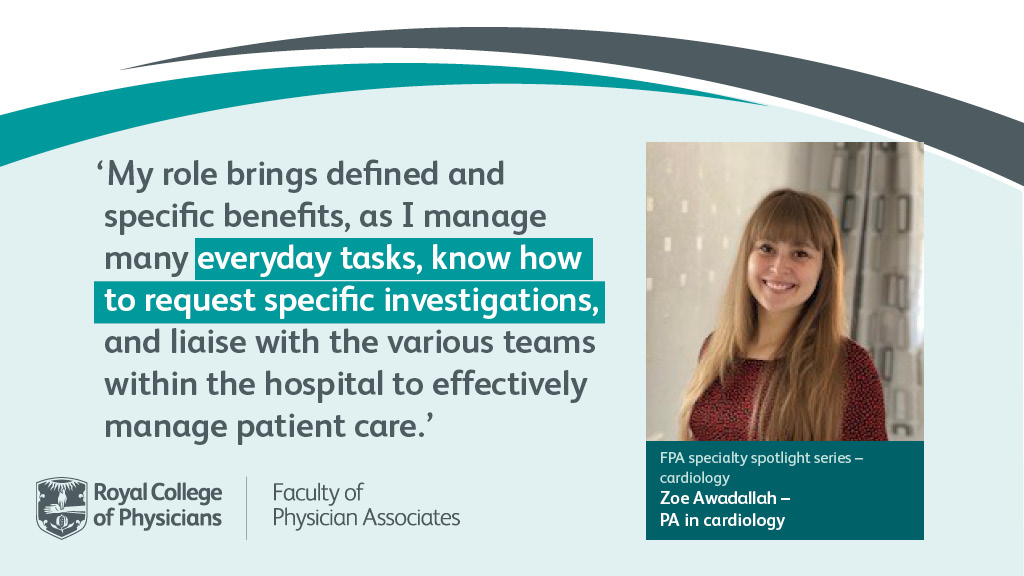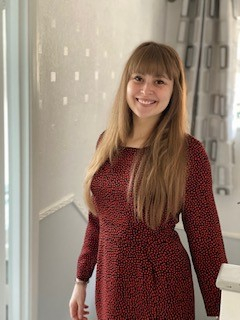Spotlight series – PAs in cardiology
Cardiology is one of the 50 specialties now practised by physician associates (PAs) in the UK. The specialty focuses on diseases of the cardiovascular system. PA Zoe Awadallah graduated from Brunel University, London in 2018 and immediately began working in cardiology. She currently works at The Hillingdon Hospitals NHS Foundation Trust and shares her story.
What made you decide to become a PA?
When I started secondary school, I thoroughly enjoyed biology and chemistry. I remember completing a heart dissection in biology and I was fascinated by the intricate structures of the heart. This interest continued to grow throughout my secondary school studies, and I really enjoyed learning about the physiology of disease, and the impact it had on the human body. I went on to study biomedical science as my undergraduate degree and initially had intentions of pursuing a career in research.
I first learned about the PA profession when a guest lecturer came to my university to share information about the course. This piqued my interest, and I carried out further research, including attending open days at potential universities. After learning more, I decided it was the ideal path to follow my interest in medicine, and I enrolled on the course.
Can you tell us more about your experience of working as a PA in cardiology?

Initially, when I started my PA course, I was interested in working in A&E, as I enjoyed the fast-paced nature of the department. It was during my cardiology placement at Hillingdon Hospital (where I went on to secure my PA role) that I learned more about the specialty. I was struck by how supportive the team was, and I constantly felt engaged by the work. We operate a thriving cardiology department and are closely linked to Harefield Hospital, meaning we see a wide range of interesting cases. I am now in the fourth year of my role, and I have received continued support from registrars, consultants, and specialist nurses. From the beginning, they have wanted to see me succeed and progress my skills, which has been fantastic.
I currently operate a twice-weekly rapid-access chest pain clinic. I examine and treat patients that have been referred to us by their GP; patients are referred after experiencing new symptoms of chest pain. It is my responsibility to review patients’ clinical history, discuss their symptoms and review the case to ascertain the cause of their symptoms – and if this may relate to an underlying cardiac cause. Running these clinics has provided me with great experience as I put my learning into practice to form the best treatment plans for my patients, while also building positive relationships.
What diagnostic/investigation/procedural skills have you gained?
As a specialty, cardiology is fast-paced and you don’t always know what will come next. Upon qualification, I passed the advanced life support (ALS) course. This provided me with the skills and confidence I needed to care for my patients who became acutely unwell. When I first qualified and entered my role, I observed my consultants closely during clinics. This helped me to understand how to effectively take patient histories and know what investigations needed to be done. In my clinics, I treat between 10–12 patients per session. Before COVID-19, these were face-to-face clinics, but these quickly transitioned to become telephone consultations. This enabled me to use my knowledge further to help identify patients who required urgent diagnostics – sometimes, even as an inpatient. For example, if a patient was showing signs of unstable symptoms, they were advised to attend the hospital for an inpatient review by the cardiology team.
Currently, I am in the process of supporting my consultants with a cardioversion list (a procedure in which an electric shock is delivered to the heart to restore a normal rhythm). We currently complete urgent inpatient cardioversions when it is clinically required, which I often support. In the long term, we are aiming to re-establish our outpatient cardioversion list, with me and one of the specialist nurses running this alongside a designated consultant.
In the future, I aim to secure a place on the focused echocardiography course in emergency medicine. This will allow me to perform rapid echocardiography for acutely unwell patients. The procedure helps identify and eliminate conditions such as cardiac tamponade, which can be life-threatening. Having an additional member of the team able to perform this procedure will enable our department to ensure effective patient care in a timely manner.
How would you describe the impact your role as a PA has had?
Working in a busy hospital as a PA, I provide consistency for our consultants and junior doctors. This proves extremely useful as, I can keep up to date with a patient’s current clinical condition during their hospital stay. This ensures a succinct and timely ward round, which is positive for both the patients and the team. Being a consistent figure within the department has enabled me to develop positive relationships within the wider multidisciplinary team, which has helped to provide holistic patient care.
I continually receive positive feedback from our junior doctors, too. My role brings defined and specific benefits, as I manage many everyday tasks, know how to request specific investigations, and liaise with the various teams within the hospital to effectively manage patient care.
What do you find most enjoyable and rewarding about being a PA?
As mentioned, a portion of my role as a PA is working alongside and within the wider multidisciplinary team. I enjoy this and thrive on ensuring that we optimise the level of care that is delivered, from both a medical and social perspective. I treat a lot of the same patients who are regular visitors to our department and need to attend regular appointments, including patients who suffer from decompensated heart failure.
Similarly, patients experiencing severe heart failure require consideration for iron replacement device insertion, investigations of the cause of their heart failure, and initiation and escalation of their heart function treatment. As a consistent clinician, I enjoy building and maintaining positive relationships with these patients. I also enjoy the holistic approach that is required to treat those patients, and it is extremely rewarding when they are subsequently reviewed in the clinic and report significant improvement in their symptoms and quality of life.
 What challenges do you face as a PA working in cardiology?
What challenges do you face as a PA working in cardiology?
The lack of prescribing isn’t a unique challenge, but it is one that I’m faced with regularly in cardiology – it can be difficult and frustrating when I’m on call. I can’t always help with some requests. Treatment plans then slow down, as the request must be re-escalated to a consultant or senior doctor.
Working throughout COVID-19 was a tough challenge, as our junior doctors were rotated once a week on the COVID wards. We maintained the cardiology inpatient service, along with creating an acute medical ward. This saw patients from various specialties, including gastroenterology. As a PA, I maintained continuity on this ward and helped relay the status of patients to the relevant consultants. While this was challenging, I thoroughly enjoyed the experience, and I was able to learn more about other specialties and gain new knowledge.
What does the future look like for you as a PA?
I enjoy cardiology and the complexity the specialty offers. My next aim is to achieve sign-off on supporting the outpatient cardioversion list. I’m also keen to progress and support our consultants in the arrhythmia clinics. The aim is to gain further independence within the scope of my practice in the outpatient setting.
I have a strong interest in training and teaching, too. I’m keen to get involved in training future PAs, and I’m in the process of undergoing training to become an OSCE examiner for the national exam.
What advice would you give to a PA looking to work in cardiology?
The most important element is acquiring the knowledge and experience in recognising and appropriately escalating an emergency. When working in a fast-paced cardiology ward, patients can rapidly deteriorate. Learning a structured A–E assessment tool on the ALS course has enabled me to assess a situation and ascertain the clinical urgency of a patient’s presentation. I then begin establishing an appropriate treatment plan until they are reviewed by a senior doctor.
We’re always looking for qualified PAs who are FPA members to share their stories. If you’re interested in sharing yours, get in touch using the contact details below. If you’re thinking of a career as a PA, you can learn more about how to begin your journey here.
Get in touch to share your PA story:
Jenna Donaldson – FPA communications officer
